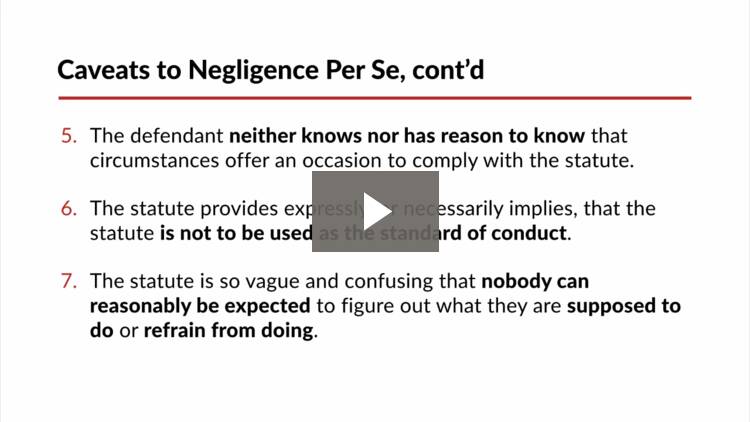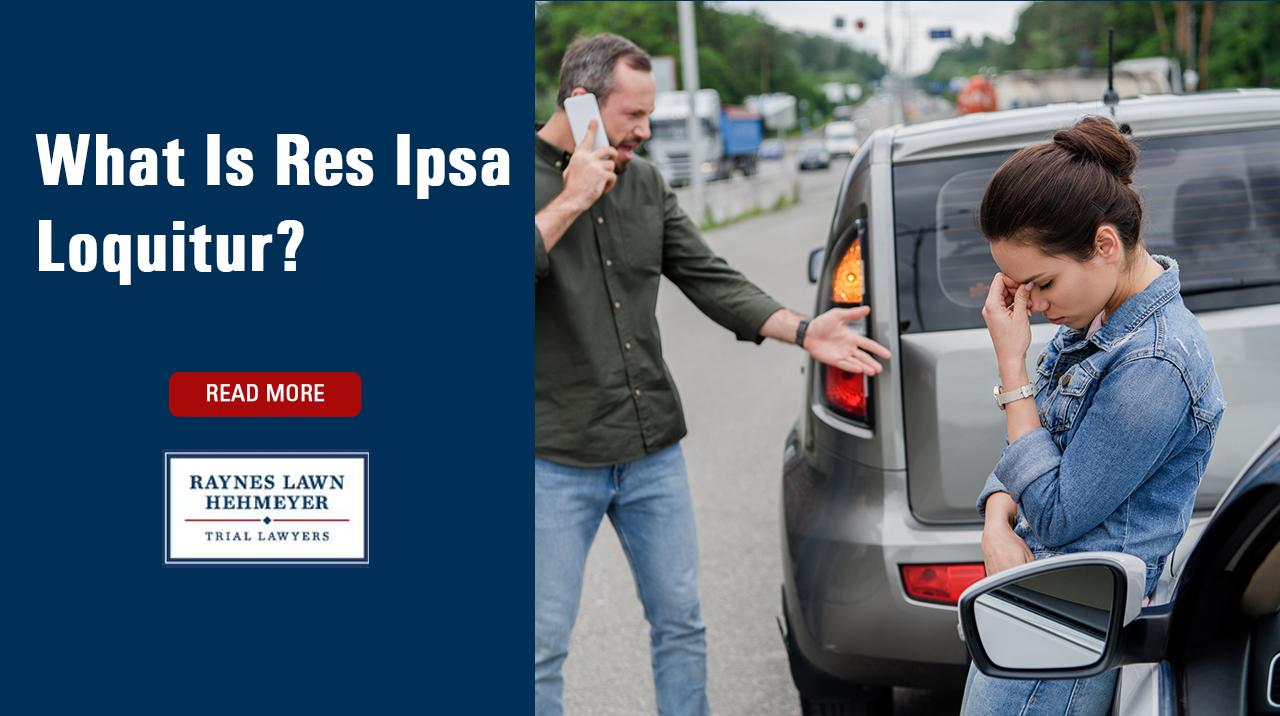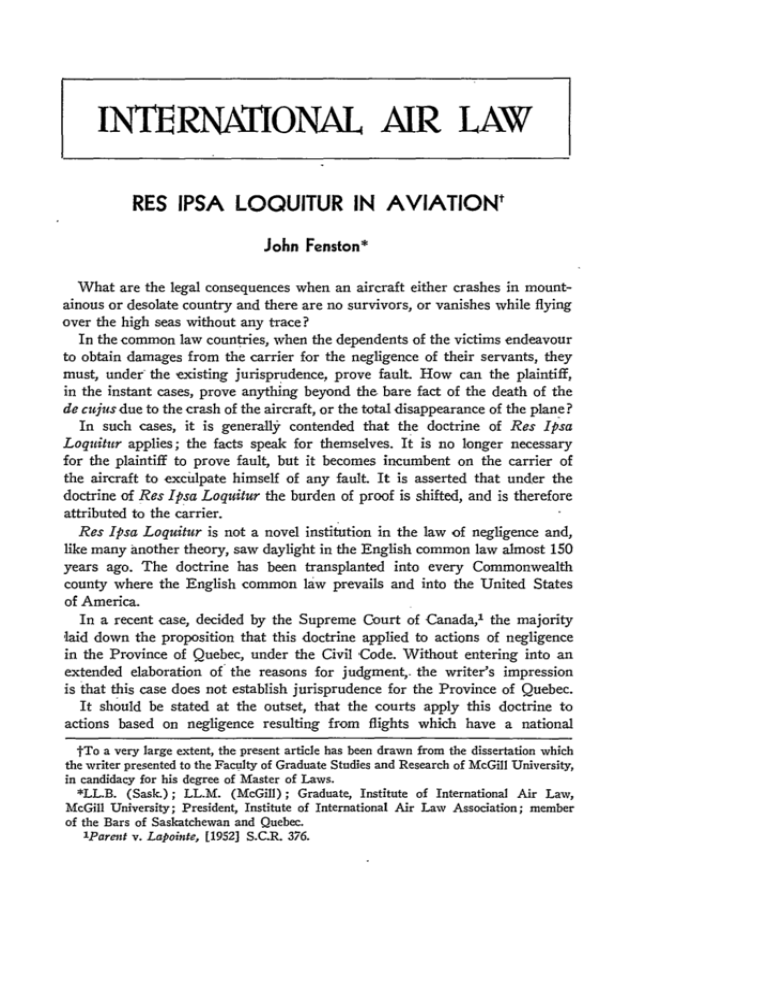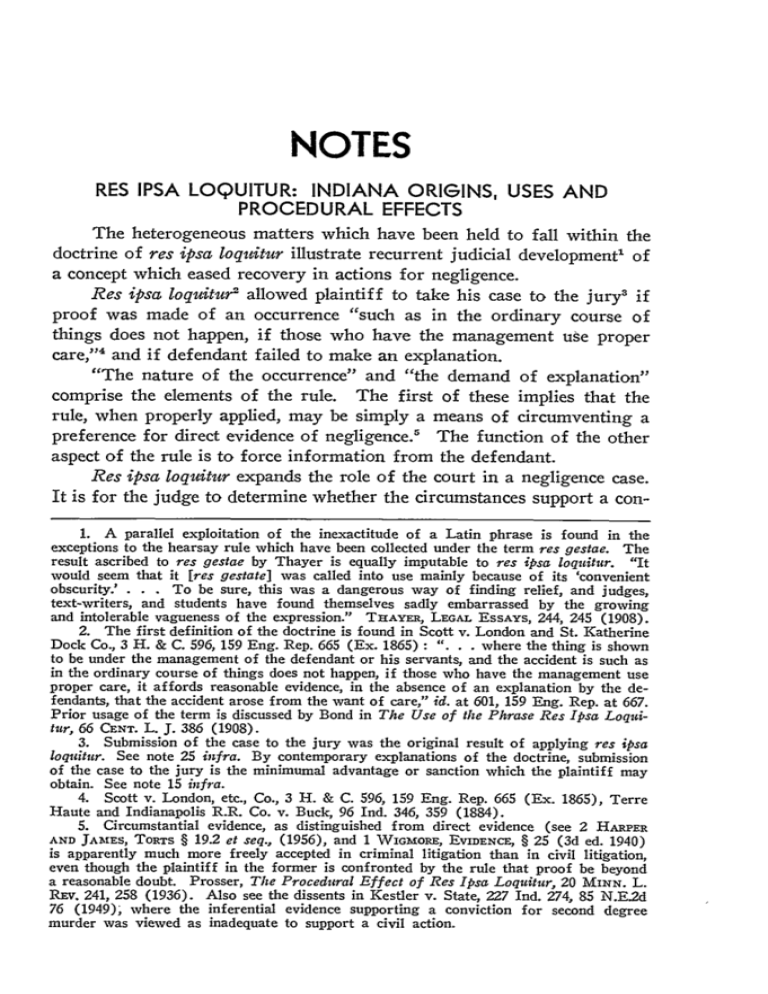Describe Res Ipsa Loquitur and When It Is Used
That is because res ipsa is that it carries the presumption that the injuries sustained had to have been a result of negligence. Ordinary negligence is a slightly different situation than Res Ipsa.

Torts Videos Negligence Per Se And Res Ipsa Loquitur Quimbee
However in personal injury law res ipsa loquitur acts as an evidentiary rule that allows a victim plaintiff in a personal injury case to establish a presumption of negligence on the part of the at-fault party the defendant through the use of circumstantial evidence.

. The elements of res ipsa loquitur are. Up to 25 cash back In different kinds of injury-related cases res ipsa loquitur Latin for the thing speaks for itself is a rule that may be used where the injured person has no direct evidence of how the injury occurred. To apply this doctrine there are three elements which must be met.
1 the defendant was in exclusive control of the situation or instrument that caused the injury. 2 rows Res ipsa loquitur is a doctrine which applies when the negligence is so apparent a presumption of. In Latin res ipsa loquitur means the thing speaks for itself.
The phrase res ipsa loquitur comes from a mid 19th century British case called Byrne v. A doctrine or rule of evidence in tort law that permits an inference or presumption that a defendant was negligent in an accident injuring the plaintiff on the basis of circumstantial evidence if the accident was of a kind that does not ordinarily occur in the absence of negligence a plaintiff who establishes the elements of. This means that while.
What is nice about res ipsa is that the plaintiff can present the case in chief against the defendant doctor through purely circumstantial evidence. And instead stated that it was providing a rule for the use of circumstantial evidence in establishing breach of duty. Res Ipsa Loquitur meaning the thing speaks for itself in Latin is a principle in tort law that allows plaintiffs to meet burden of proof with circumstantial evidence.
The rule comes up with some frequency in medical malpractice cases because an unconscious or sedated patient is almost always at a loss. A rebuttable presumption or inference that the defendant was negligent which arises upon proof that the instrumentality or condition causing the injury was in the defendants exclusive control and that the accident was one that ordinarily does not occur in the absence of Negligence. Res Ipsa Loquitur and Legal Implications.
Res ipsa loquitur is a Latin phrase that can be translated in English as the thing speaks for itself It is also used in the law to prove negligence by circumstantial evidence when there is not enough evidence to prove actual negligence. Res ipsa loquitur is a doctrine of circumstantial evidence that is sometimes used in personal injury cases. Latin the thing speaks for itself.
2 the injury would not have ordinarily occurred but for the defendants negligence. Res Ipsa Loquitur is a phrase that has entered into the legal lexicon for cases falling under the tort law doctrine of civil negligence. Its used when specific factual circumstances lead to an inference that an accident and injuries were caused by negligence but any evidence of negligence is.
Res Ipsa Loquitur commonly referred to as Res Ipsa is a Latin phrase meaning the thing speaks for itself Res Ipsa is an early tort doctrine borrowed from English common law used to describe certain events with regards to negligence. A doctrine or rule of evidence in tort law that permits an inference or presumption that a defendant was negligent in an accident injuring the plaintiff on the basis of circumstantial evidence if the accident was of a kind that does not ordinarily occur in the absence of negligence a plaintiff who establishes the elements of res ipsa loquitur can. One important legal term in personal injury cases is res ipsa loquitur The Latin phrase roughly translates as the thing speaks for itself Its a term used to describe how evidence can establish that a defendant acted negligently and should be.
For purposes of this article all you need to know is that the world would have been better off if the court had not used Latin. It allows a finding of an inference of negligence in certain circumstances. Res ipsa loquitur is a Latin phrase that means the thing speaks for itself In personal injury law the concept of res ipsa loquitur or just res ipsa for short operates as an evidentiary rule that allows plaintiffs to establish a rebuttable presumption of negligence on the part of the defendant through the use of circumstantial evidence.
Free Consultation 916 774-7200. Although modern formulations differ by jurisdiction Anglo-American common law originally stated that the. Res Ipsa is used to determine negligence.
Legal Definition of res ipsa loquitur. The plaintiff did not contribute to the cause. It is important to note that not all accidents are caused by negligence.
The incident was of a type that does not generally happen without negligence. Res Ipsa Loquitur is a latin phrase that often used in personal injury cases. Res ipsa loquitur is a doctrine in the Anglo-American common law and Roman-Dutch law that says in a tort or civil lawsuit a court can infer negligence from the very nature of an accident or injury in the absence of direct evidence on how any defendant behaved.
Here are the history and fascinating modern approach to discussing this legal subject. It was caused by an instrumentality solely in defendants control. By using res ipsa loquitur a plaintiff will need to prove the defendants negligent state of mind through.
In keeping with its name Res Ipsa describes a situation where an accident could not have occurred without negligence. To prove res ipsa loquitor negligence the plaintiff must prove 3 things. It is called the doctrine of res ipsa loquitur and it is Latin for the thing speaks for itself.
Its a Latin phrase that translates into the thing speaks for itself. Res Ipsa Loquitur Meaning. 3 the plaintiffs injury was not due to his own action or contribution5 If these elements are met the burden.
To use res ipsa loquitur there must be no other explanation for the injury except negligence. The phrase is a doctrine that is the basis of many injury cases. Res Ipsa Loquitur is a doctrine of evidence based on mysterious manner of causing harm to the plaintiff that is not necessarily identifiable Allows a plaintiff make establish a prima facie claim of negligence based solely on.
Res ipsa loquitur or res ipsa as it is commonly called is really a rule of evidence not a rule of. Even if an incident occurred and there were severe injuries the court will not always assume that negligence was involved.

What Is Res Ipsa Loquitur Raynes Lawn Hehmeyer

Res Ipsa Loquitur In Aviation Mcgill Law Journal

Res Ipsa Loquitur Definition Examples Cases Video Lesson Transcript Study Com

Res Ipsa Loquitur Indiana Origins Uses And Procedural Effects
Comments
Post a Comment